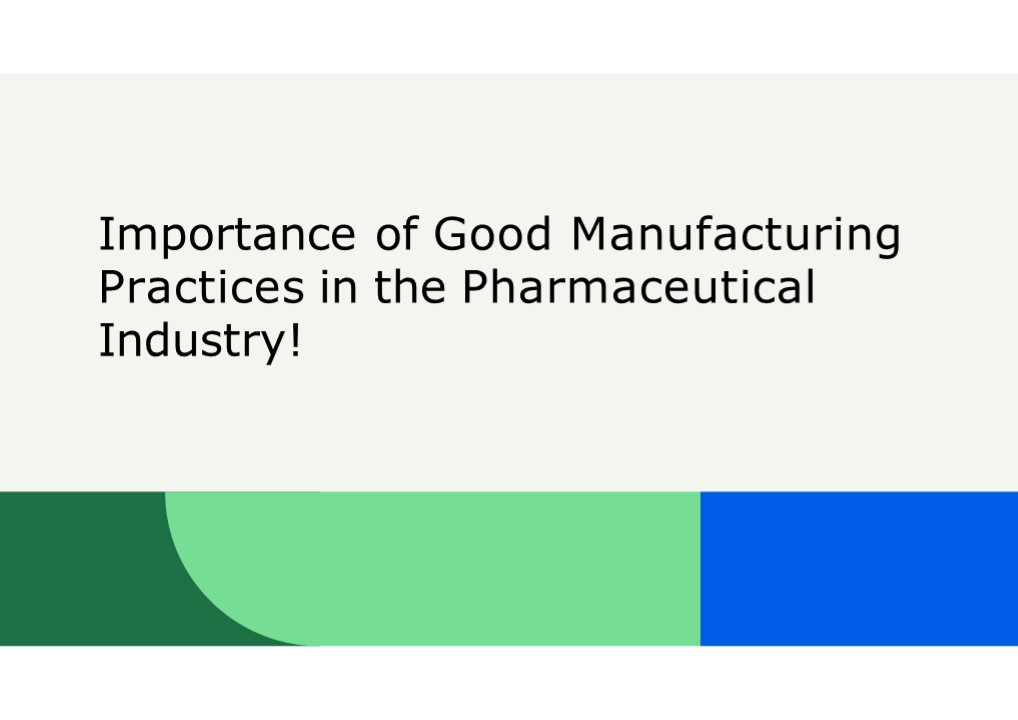Importance of Good Manufacturing Practices in the Pharmaceutical Industry! - PowerPoint PPT Presentation
Title:
Importance of Good Manufacturing Practices in the Pharmaceutical Industry!
Description:
Most people are unaware of GMPs, but pharmaceutical grade affects all consumers. Good Manufacturing Practices (GMPs) for pharmaceutical products are the regulatory standards that govern pharmaceutical quality. Gxp Cellators is the top GMP facility setup consultant in Canada, assisting the pharmaceutical business in maintaining quality. – PowerPoint PPT presentation
Number of Views:37
Title: Importance of Good Manufacturing Practices in the Pharmaceutical Industry!
1
Importance of Good Manufacturing Practices in the
Pharmaceutical Industry!
2
Most people are unaware of GMPs, but
pharmaceutical grade affects all consumers. Good
Manufacturing Practices (GMPs) for pharmaceutical
products are the regulatory standards that govern
pharmaceutical quality. Gxp Cellators is the top
GMP facility setup consultant in Canada,
assisting the pharmaceutical business in
maintaining quality.
3
Pharmaceutical Industry Quality Assurance
Quality assurance (QA) is a comprehensive concept
that encompasses all of the most critical parts
of the drug manufacturing process. It is a
process performance and product quality
monitoring system that assists businesses in
protecting their image and avoiding regulatory
penalties. However, it also assures that the
prescription treatment has the desired effect and
that the drugs are in compliance with the
regulations. It should be emphasized that if a
manufacturer fails to fulfill pharmaceutical
grade standards, they may be subjected not only
to significant fines but also to legal action
that could imperil their business. As a result,
anybody participating in the production process
must get specialist pharmaceutical training from
GMP facility setup consultants in Canada.
4
Procedures
GMPs hold manufacturers accountable by demanding
documentation and recording of procedures. A
protocol is a set of rules for carrying out
important activities such as pharmacovigilance,
cold chain, batch recalls, and so on to produce a
consistent result. It must be presented to all
personnel, and if necessary, training from a GMP
facility setup consultant in Canada must be
offered. Any deviation from the method must be
investigated and reported.
5
Primary Materials and Products
Before being given to consumers, all products
must undergo continuous testing, comparison, and
quality assurance. Furthermore, the raw materials
utilized in the formulations must have accurate
specifications at each stage of fabrication, and
the master recipe must be documented. Standard
processes for product packaging, testing, and
sampling should be used. Finally, test findings
must be documented so that producers are always
prepared for internal or external product audits.
6
Processes
Each process must be properly defined, well
documented, consistent, delivered to all
personnel, and assessed. Indeed, regular
evaluations are essential to guarantee that all
operations adhere to existing protocols and
fulfill the necessary criteria. The processes
must be visible to the manufacturer. Continuous
improvement is a notion that drives GMP facility
setup consultants in Canada, therefore compliance
must be provable by an auditor at any moment and
ready for self-inspection to assist in any
conceivable improvement.
7
Property and Equipment
Premises in pharmaceutical manufacturing include
anything outside the facility's boundaries. This
is due to restrictions governing the surrounding
area, such as water systems and garbage disposal.
Having said that, the premises have all of the
infrastructure and systems centered on hygiene to
avoid cross- contamination, accidents, or even
fatalities. To reduce the risk of equipment
failure, all equipment should be correctly put or
kept and continually validated and calibrated to
ensure it is suitable for producing consistent
results. Furthermore, there must be clear
protocols and documents in place for cleaning the
premises and equipment.
8
- Conclusion-
- The GMP is designed to promote a chain of
cleanliness and sanitation in the manufacturing
process. It restricts hand contact with the drug
product and mandates the implementation of a
predefined standard operating procedure. Firms
must conduct periodic testing and confirm that
their products meet the desired requirements.
The ongoing success of a pharmaceutical company
relies on these practices. These regulations are
in place to prevent any flaws from compromising
the quality of the drugs produced. In addition to
this, compliance with Good Manufacturing
Practices (GMPs) can help to reduce the risk of
being sued by customers.
9
Thank You































